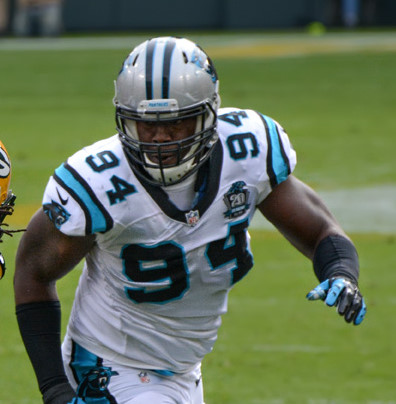Oct 12, 2016At the Top
Professional football players compete at the highest level, but that doesn’t mean that their methods for gaining strength and staying healthy are reserved for the elite. Carolina Panthers defensive end Kony Ealy talked with Men’s Fitness and explained how his workout routines and diligent stretching, combined with proper nutrition and a lot of determination, help him thrive in the NFL. High school coaches can use these same methods to get the most out of their young athletes.
Stretching: Ealy completes a full spectrum of exercises based on improving all around strength and specific skills needed at his position, but he has found that proper stretching is what truly takes these weightroom gains to the next level.
“I do squats, bench work, and weight training, but I’ve found that they don’t really dig deep enough on their own to help you develop overall as a player. Stretching is crucial for me. As hard as you’re working out, you also need to dedicate time to stretching — it doesn’t have to be a high-intensity stretch every time, but you need to work through those muscles and keep them loose.
“I cannot emphasize enough how important stretching is,” Ealy continued. “I’m utilizing and developing muscles that I never knew I had, and it’s because of stretching right. I feel like I am getting to another level in my training because of that work on keeping things loose.”

Band workouts: Combined with stretching, Ealy uses band workouts to keep his muscles strong and flexible. Using bands is a great way to supplement weight training and work different muscle groups while also taking pressure off of joints or areas of injury.
“I do a lot of band workouts because of my shoulders and joints. It’s very important to work those muscles and that’s where I’m usually the sorest towards the end of a game. The band workouts help a lot, and by keeping those areas strong, and they help prevent injury. I also work on hand-eye coordination, on neck strength, and obviously a lot of core. You need to stay flexible and get low, especially when you’re tired,” he said.
Self-training: Not all athletes need to be coached through every aspect of the game. Some thrive through their own determination and are able to visualize their goals without a coach present. All coaches, however, can play a role in supporting this individual work ethic by encouraging athletes to set aside time for themselves to mentally focus on the game.
The part of the game that Ealy is often trying to mentally prepare for is getting off the ball on the line of scrimmage.
“It’s all about getting off the ball,” he said. “I love to self-train — nobody else out there, no coaches, just me. I pretend that I’m in game situations and that’s one way that I really focus in the offseason.”
Hand exercises: One thing that helps Ealy get off the ball and to the quarterback as quickly as possible is his lightning quick hand-eye coordination. He uses a variety of exercises in order to keep his eyes and hands strong and working together.
“I do a lot of quick-twitch exercises trying to come off the ball quickly without pre-planning what I’m going to do. It’s a lot more reactionary and helps you learn to think and react in the moment. That has really helped my game a lot,” he said.
Diet: Rounding out this entire regimen is a high-calorie nutritious diet. Proper nutrition is an area of fitness and performance that is often ignored or not emphasized at the high school level, yet it can make all the difference, especially in a sport like football. Coaches should educate their players on how to eat properly in order to recover and refuel, otherwise they will be at higher risk for injury and will not get the most out of their hard work in training.
Ealy described what his diet is like during the season and how it helps him maintain his health and weight.
“Going into and throughout the season, I eat a lot of lean protein and baked foods — nothing fried. I eat a lot of fruit, veggies, and yogurt as well. This diet has helped me keep my energy levels high and it really makes a big difference. Everything that goes into your body is important.
“I eat five meals per day during the season,” he continued. “You are burning so many calories at practice and in games, it’s important to maintain your weight. I start the day with a well-rounded breakfast in the morning and then will have a small meal and snack mid-morning. Around noon, I’ll have lunch and then another small meal or snack mid-afternoon before dinner in the evening.”



